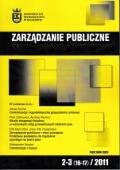Skutki ekspansji fiskalnej w warunkach stóp procentowych bliskich zera
The effects of fiscal expansion at the zero lower bound of interest rates
Author(s): Andrzej Rzońca, Piotr CiżkowiczSubject(s): Economy
Published by: Uniwersytet Ekonomiczny w Krakowie we współpracy z Wydawnictwem Naukowym Scholar
Keywords: fiscal expansion; zero lower bound of interest rates; financial crisis
Summary/Abstract: Th e following paper analyzes the eff ects of fi scal expansion at the zero lower bound (ZLB) of interest rates. The analysis uses the New Keynesian framework, which is commonly applied by central banks. Th e authors demonstrate that monetary policy can be deemed incapable of closing a negative output gap only under certain assumptions. Namely, the central bank must be unwilling or unable to commit to maintain the real interest rate below its natural level for a sufficiently long period, or by suffi cient margin after the distortion lowering the natural rate of interest or aggravating fi nancial market frictions fades. Th is kind of ineffi ciency of monetary policy in stimulating aggregate demand is temporary and may occur especially when the distortion lowering the natural rate of interest or aggravating financial market frictions is not only substantial but also persistent. The authors discuss its implications for effi ciency of fiscal expansion, and show that if the distortions, which are the source of monetary policy ineffi ciency, persist, the probability of eff ective fi scal expansion diminishes. Against this background, the authors outline the risk the economy can face when fi scal expansion is ineffi cient at the ZLB, and demonstrate that the expansionary fiscal policy can consolidate the setup of low economic activity at the ZLB, instead of – as frequently argued – improving it.
Journal: Zarządzanie Publiczne
- Issue Year: 2011
- Issue No: 16+17
- Page Range: 23-44
- Page Count: 21
- Language: Polish

